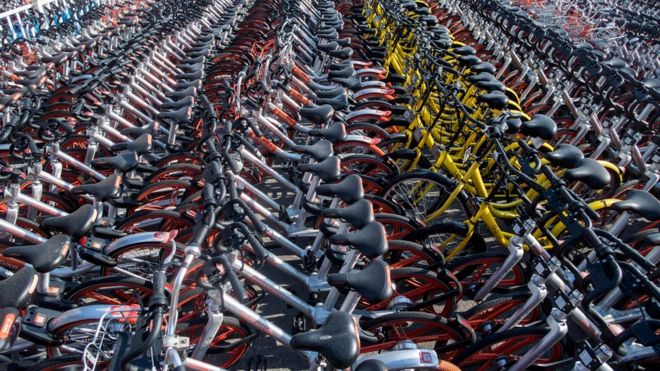He was cycling eastbound on Slaughter Beach Road in Milford, Delaware around 7:35 Thursday morning.
A Ford pickup truck was going the same way--and struck the cyclist.
The driver, Shawn E. Armstrong of nearby Lewes, stopped to help the cyclist. But the cyclist, 76-year-old Thomas Draper of Milford, didn't survive the impact.
He is well-known in his community--and throughout the Delmarva area--as the longtime owner of WBOC, one of the largest television stations in the area. He also owned other television stations and media outlets in the area, as well as other parts of the United States.
 |
| Thomas Draper |
At least Armstrong stopped when he realized he'd struck Draper. That is, unfortunately, more than can be said for too many other drivers in similar situations.
It wasn't difficult to see this coming: Beijing has banned all new bike-share bikes.
China's largest city has been bedeviled by the same problems as other municipalities where Ofo, Mobike and other private bike-share companies have set up shop: bicycles are left haphazardly on sidewalks, around people's houses and even in the middle of intersections--or they've been stolen, vandalized or even destroyed.
It seems that the very advantage those share companies offered--their chip-implanted bikes could be located with an app and left anywhere, and didn't have to be taken from or returned to docking stations--also made life easy for vandals, thieves and people who are simply inconsiderate of others.
Beijing is not the first Chinese city to ban new share bikes. Since it is the largest, though, it begs the question of whether similar bike share schemes in the rest of the country are doomed. Moreover, these bans are taking effect just as similar programs are starting in municipalities outside China.
In particular, I wonder about similar operations in the US: Just last month, Ofo began operating in Seattle, as an example. It seems that such private companies appealed to cities like Seattle, where an earlier city-funded bike share program failed, or other American cities that are reluctant to use public funding, or where corporations like Citibank (the sponsor of New York's Citibike) might be reluctant to invest in such a project--or where property or business owners don't want docking stations by their frond doors.
In cities large and small all over the world, there is certainly a demand for bike share programs. Now the problem seems to be one of how to make them useful and practical without creating nuisances or hazards.
The Dutch ride bicycles more than just about any other people in this world.
Their capital, Amsterdam, has more than one hundred kilometers of canals and about 90 islands. So, perhaps, it's not surprising that the city has about 1500 bridges--or that some of those bridges are devoted to bicycles.
As an American, it's difficult for me to imagine any city in this country even envisioning a bridge for bicycles. Hey, some of our major bridges, such as the Verrazano-Narrows, don't even have pedestrian or bike paths!
As an American, it's interesting--though not surprising--to me that the Dutch are also among the world's leaders in applying advanced technology to everyday life, and their infrastructure.
So, perhaps, it was inevitable that the first 3D printed bicycle bridge would be built in the Netherlands.
Yes, you read that right. The Eindhoven-based construction company BAM has collaborated with the Technical University in that same city to create a structure that will be 8 meters (26 feet) long and 3.5 meters (11.5 feet) wide when it is set up in the nearby town of Gemert, where it has just been delivered.
The bridge is constructed in eight one-meter segments which will be connected with a special concrete mortar. Thus assembled, it will be built between two bridge heads and secured by cables.
Cyclists riding across Peelsche Loop in Gemert can
expect to see the bridge in place by October, according to published reports.



